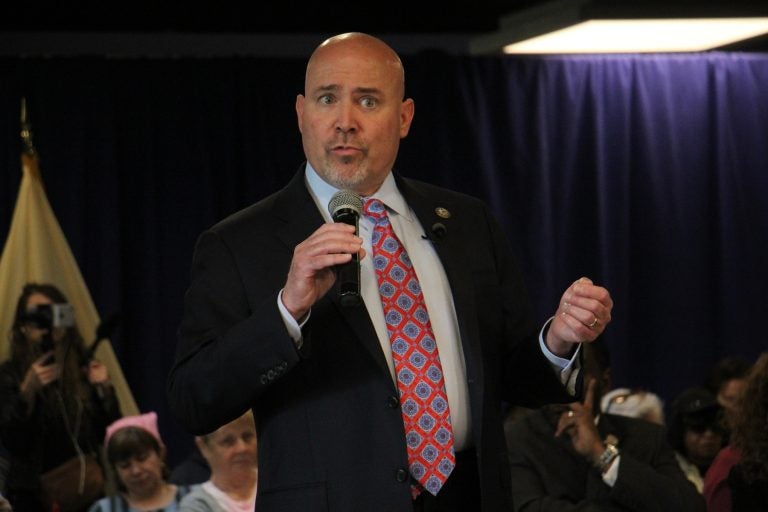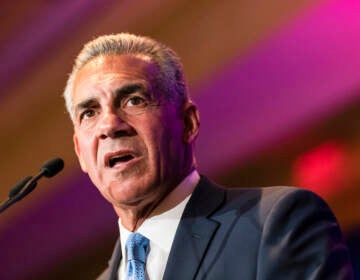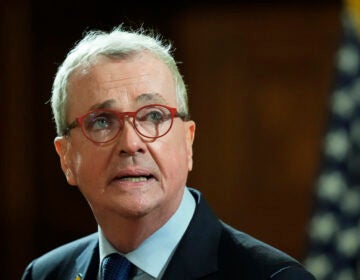Murphy move to legalize recreational pot gets fractured response from N.J. delegation
'I think it’s nuts,' says U.S. Rep. Tom MacArthur of plan for legalizing recreational marijuana.
Listen 3:52
South Jersey Republican U.S. Rep. Tom MacArthur at a town hall in Willingboro, May 10, 2017. (Emma Lee/WHYY)
For New Jersey Gov. Phil Murphy to fulfill his campaign promise to legalize recreational marijuana in the Garden State, he will need allies in Congress. But rounding up that support is proving to be a formidable task.
Even some members of his state’s own congressional delegation don’t agree with his push to regulate marijuana in the same way as alcohol.
What’s more, the Democrat’s plan could set up a confrontation with the Republican administration and the federal statutes that outlaw any use of marijuana. U.S. Attorney General Jeff Sessions has sought congressional permission to shut down medicinal and recreational marijuana businesses — even in states that have legalized those industries.
Murphy, who said he is unfazed by the prospect of such a showdown, said Congress so far has managed to keep federal intervention at bay.
“It has not impacted us, and we believe it will not,” he said. “That doesn’t mean that we’re not paying attention.”
Murphy has already moved to overhaul the state’s medical marijuana program.
“We will deliberately and steadily get to the recreational side,” he said.
Central Jersey U.S. Rep. Leonard Lance, a Republican, said he’s open to part of Murphy’s plan.
“I favor medical marijuana, but I do not favor recreational marijuana,” he said. “I think it sends a very poor message to young people.”
Many of Lance’s GOP colleagues also support medical marijuana, but they aren’t ready to follow the lead of Colorado, California, and Vermont where recreational pot is legal.
Other Garden State Republicans are outspoken in their opposition.
“I think it’s nuts,” said U.S. Rep. Tom MacArthur of South Jersey. “It’s just nuts.
“We’re in the midst of the worst drug crisis in our history, and this new governor wants to do a social experiment and see – and test out whether marijuana is a gateway drug so he can raise money for the state?” he said. “It’s nuts to me.”
MacArthur said he’s concerned about the health of the next generation.
“Everyone knows that it’s particularly damaging to the developing adolescent brain, and yet he wants to rush off and make New Jersey the California of the East. Let him go be the mayor of San Francisco or the governor of California,” MacArthur continued. “But don’t do this to the state of New Jersey.”
New Jersey’s junior senator, Democrat Cory Booker, dismissed MacArthur’s objections.
“I think he’s wildly out of step with his own state, and he should maybe look at the overwhelming popularity of decriminalizing marijuana, making it legal,” Booker said.
Booker, who is often mentioned as a potential Democratic presidential aspirant in 2020, has been a leading voice on Capitol Hill calling for normalizing pot use.
MacArthur’s position, he said, is off base and could contribute to worsening the opioid epidemic that has plagued New Jersey and the rest of the nation.
“What I’m hearing from doctors in New Jersey and beyond, is that [marijuana’s] an off-ramp drug. That it helps people get off of opioid addiction,” Booker said. A recent poll found that 49 percent of New Jersey residents support legalizing recreational marijuana, while 44 percent are opposed.
Still, MacArthur has not taken a hard line against all marijuana-related changes. For instance, he’d like to see a criminal justice overhaul package that would make it easier for people with marijuana convictions to start over.
“I am open to not using marijuana offenses as forcing people into the criminal justice system, because some people never get out of it, and it defines their entire life,” MacArthur said.
Some prominent Democrats in the New Jersey Legislature are pushing decriminalization as an alternative to legalization. Under that scenario, marijuana would still be considered illegal, but enforcement of the law and penalties for breaking it would not be as severe.
Murphy would be wise to consider that option seriously, MacArthur said. “There’s a lot of daylight between decriminalizing and legalizing for recreational use.”
While Murphy will be counting votes in the Statehouse in Trenton to get a legalization bill passed, his support — or lack of it — in Washington matters.
If he’s able to gets such a law, he’ll be looking to Congress for help so Washington doesn’t kill off the legal pot industry before its first harvest.
WHYY is your source for fact-based, in-depth journalism and information. As a nonprofit organization, we rely on financial support from readers like you. Please give today.




